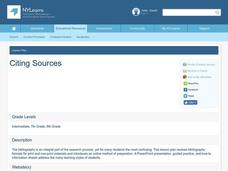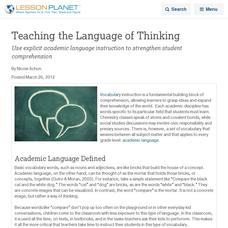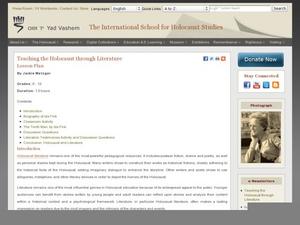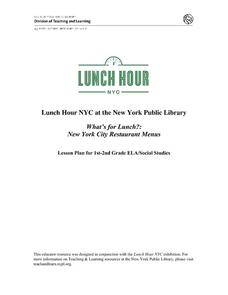Curated OER
What We Leave Behind
Students analyze primary source documents from the 1830's. They examine how records, memoirs and artifacts preserve history and discuss what should be placed in a time capsule for future generations.
Curated OER
African Americans Seen Through the Eyes of the Newsreel Cameraman
Fifth graders become familiar with the role of African Americans during WWII. In this WWII lesson, 5th graders watch a newsreel and discuss its use as a primary source. Students answer questions about the newsreel.
Curated OER
George Washington: First in War, First in Peace, and First in the Hearts of His Countrymen
Learners interpret historical evidence presented in primary and secondary resources. In this George Washington lesson plan, students research the details of Washington's military successes, his role at the Constitutional Convention, and...
Curated OER
Speaking in Grave Tones
Fourth graders examine how a change in attitudes about death took place from the late eighteenth to the early nineteenth century and was embodied in gravestones, literature, and art.
Curated OER
The 'Capital' of the World
Students are introduced to the purpose of the World Bank and its president Paul Wolfowitz. After reading an article, they work together to complete a writing exercise in which they use primary source documents to state their viewpoint. ...
Curated OER
Nomadic and Sedentary Tribes in Kansas
Seventh graders compare and contrast sedentary and nomadic tribe life. In this Native American culture instructional activity, 7th graders research primary documents about the Osage and Kiowa tribes. Students create a series of...
Curated OER
Daily Life in the Fur Trade: Communications & Resourcefulness
Student complete a number of activities using computer based resources and primary sources to research the fur trade. They answer questions using the computer research.
Pocumtuck Valley Memorial Association
A Research Project: A Discussion of the Recreating and Populating of a Colonial Village
Primary source research, secondary source readings, and discussion provide the understanding necessary for students to create a colonial persona, and simulate a situation appropriate for this person, time, and place. While the lesson...
Curated OER
Citing Sources
Pupils explore the purpose and requirements for a bibliography. They examine where to find bibliographic information in a variety of print and non-print sources on an assigned topic. Students prepare a bibliography online using a...
Curated OER
Citing Sources
Practice citation skills with this activity, which takes learners to the Library/Media center. There, they will view a Powerpoint presentation and practice collecting data in both print and non-print sources. All necessary materials are...
Curated OER
Race and Ethnicity in the United States
Students explore race and ethnicity as it is defined by the U. S. Census Bureau. They compare data from 1900, 1950, and 2000 and identify settlement patterns and changes in population. In groups, they map these changes and discuss...
Curated OER
Cultural Inquiry Lesson 2B: Finding Artifacts and Analysis
Students build on their knowledge of sources, by looking at 2 types of information sources: artifacts or primary sources and analysis or secondary sources. They brainstorm a list of primary and secondary sources connected to one of...
Stanford University
Siege of Golconda
Looking at art, learners explore the Mughal Empire, which once controlled all of India and created a unique Hindu-Muslim civilization. By analyzing a painting of the Siege of Golconda, historians consider what art teaches people about...
Curated OER
More than a Hostess: The Role of First Ladies
A study of the country's First Ladies deepens understanding of their role in history.
Curated OER
Teaching the Language of Thinking
Use explicit instruction of academic language to strengthen student comprehension
Curated OER
Geography and Culture of China
Take out a map, a paper, a ruler, and those coveted colored pencils for a lesson plan on Chinese culture and geography. This is a multifaceted approach to basic geography skills that incorporate story telling, class discussion, primary...
K12 Reader
Abigail Adams: Persuading Her Husband
After reading a brief excerpt from a letter written by Abigail Adams to her husband and future president of the United States, John Adams, your young historians will practice their reading comprehension skills and identify what Abigail...
Curated OER
Teaching the Holocaust through Literature
Centered on the short story "The Tenth Man" by Polish Holocaust survivor Ida Fink, here is a solid one-day resource to support study of World War II or Nazi history, short stories, or to complement any ELA unit on The Diary of Anne Frank...
Curated OER
Developing Writing Skills Through Japanese Folk Music
Students listen to Japanese folk songs to get inspired to create a writing piece about Japan. In this writing lesson, students use primary and secondary sources to add information about Japan.
New York Public Library
What's for Lunch?: New York City Restaurant Menus
Do you remember the days when a cup of coffee cost five cents? At A.W. Dennett restaurant in 1894, you could buy a five-cent cup of coffee and as well as a five-cent slice of pie to accompany it. The menu from that year is a primary...
Achievement Strategies
CCSS Unit Design Template for PE
From baseball and tennis to capture the flag and four-square, here is a great document that will help you design your next unit on a sport-related activity.
K12 Reader
What's the Purpose? FDR's Pearl Harbor Speech
FDR's December 7, 1941 address to the nation is the focus of a reading comprehension exercise that asks middle schoolers to read an excerpt from the Pearl Harbor speech and determine the president's purpose.
Curated OER
Change in Early 20th Century America: Doing the Decades
Young scholars investigate and develop relationships between selected themes and resources. In this Us history lesson plan, students interpret, analyze, and evaluate shifts in continuity throughout US history. Young scholars will create ...
Curated OER
American Lives in Two Centuries:What Is an American?
High schoolers decide what it means to be an American. In this historical perspectives lesson, students read Crevecoeur's "Letter from an American Farmer," and interviews with everyday Americans from the Works Progress Administration....

























